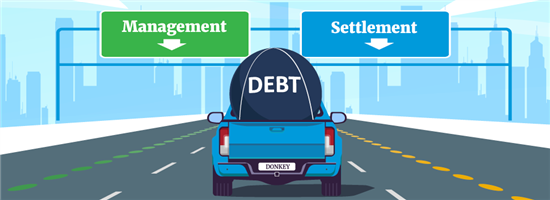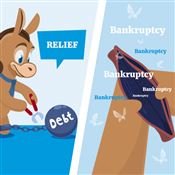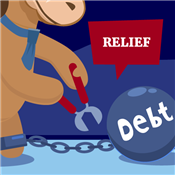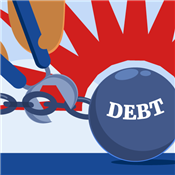Debt Management vs Debt Settlement
The difference between debt management and debt settlement lies in repayment, new debt amount, and credit impact. Read on for the detailed guide.
 |
Debt management and debt settlement are debt relief strategies. But they work differently.
Debt management structures your debts and simplifies repayment. Debt settlement, on the other hand, reduces the principal amount of the debts you owe.
Which one is better for your financial situation? You'll find out at the end of the article.
What is Debt Management?
A debt management plan or debt management program (DMP) is a repayment plan offered by credit counseling agencies.
DMPs eliminate the extra costs of debt and combine your debt payments into one monthly payment. Counselors negotiate with your creditors to reduce interest and remove fees. But keep in mind that this doesn't reduce the principal debt you owe.
The goal of these credit counseling agencies is to create a DMP you can afford for the next 3–5 years. Your monthly payment can be significantly less than your total monthly debt payments.
How does a debt management plan work?
Credit counselors negotiate with creditors to reduce or remove interest fees, apply new debt terms, and waive fees or penalties.
Debt Management Plan Process:
- Attend a consultation with a credit counselor.
- Credit counselors contact and negotiate with your creditors.
- Credit counselors create a debt management plan.
- You make your monthly payments to your agency.
- Credit counseling agency pays your creditors every month.
Most credit counseling agencies already have established relationships with different creditors. As a result, counselors can negotiate quicker on your behalf to decrease interest and fees. In some instances, the interest and fees may be removed totally.
DMPs are designed to be low-cost and help you settle debts within 5 years. What's more, if you're experiencing financial difficulties, you can request your agency to waive your DMP fees. That way, you can focus on the monthly payment calculated in your DMP.
- American Consumer Credit Counseling (ACCC)
- Money Management International (MMI)
- InCharge Debt Solutions
- Consolidated Credit
Having said all this, there are benefits and drawbacks to DMPs.
Debt Management Plan Pros and Cons
Pros
- Structured way of paying multiple debts
- Reduced interest rates, eliminated fees, and waived charges
- Can improve your credit over time
- You don't need to intentionally miss your debt payments before enrolling in a DMP
- You get to learn more about your finances apart from debts
Cons
- 3 to 5-year commitment
- You can't enroll all types of debts
- Creditors aren't required to let you enroll your debt in a DMP
- Credit counselors may advise you against taking new credit cards, credit lines, or new debts
- Temporary drop in credit at the start of the program
One disadvantage is that you can't enroll secured debts, like home and auto loans. Plus, it is up to your creditor to allow the credit counseling agency to enroll your debt in the DMP. You're also locked in a commitment to pay off your enrolled debts within a certain period.
If you're looking for an alternative approach, the next sections explain debt settlement.
What is Debt Settlement?
Debt settlement refers to negotiating with creditors so you can settle your debts for a lower payment. It is a form of debt relief primarily offered by companies like National Debt Relief and Accredited Debt Relief.
Unlike DMPs, in debt settlement, debt relief companies negotiate with creditors to lessen your principal debt.
Experienced negotiators can also negotiate with your creditors to remove fees and penalties, and agree to new terms. The best companies can take up to half of your original debt off.
Imagine Living Life Without Debt
- Get a free savings estimate today
- See how quickly you can be debt free
- No upfront fees and no obligation
How does debt settlement work?
Debt relief companies negotiate to remove interest, eliminate fees, and extend your debt's payment terms.
Debt Settlement Process:
- Attend a consultation with a debt relief company.
- Enroll in a personalized debt relief program.
- Set up a dedicated account for your monthly deposits.
- The debt relief company negotiates with your creditors for reduced debts. During this period, you also build up your money in your dedicated account.
- You pay off a creditor once you approve the negotiated debt. Otherwise, you can ask the debt relief company to renegotiate.
Debt negotiations can last for months. You need to intentionally miss your debt payments throughout the program. Logically, your creditors will agree to a settlement rather than risk getting nothing.
If you want to be more hands-on, do DIY and put your negotiation skills to the test. Contact your creditors to negotiate for lower debt or new terms. Note: You still need to stop paying your balance to increase the chance of your creditors agreeing to negotiations.
In the next section, discover the pros and cons of debt settlement.
Debt Settlement Pros and Cons
Pros
- Reduce your principal debt significantly
- Eliminate or lessen interest rates, fees, and charges
- Resolve debts faster
- Lessen calls from creditors
- Avoid bankruptcy
Cons
- Possibility of lawsuits
- Creditors don't need to accept negotiations
- Debt relief companies can have expensive fees
- Your credit score may take a hit
- You may owe taxes on forgiven debts
- Negotiations can take time before you reach a settlement
Some debt settlement companies charge expensive fees. These fees are typically 15–25% of your total enrolled debts. Other companies may charge even more. That said, avoid companies that charge upfront. It's illegal to charge upfront fees before performing any service.[1]
Since debt management and debt settlement help you settle your debts, they do have their similarities.
Key Similarities
Debt management and debt settlement are both debt relief methods. Their goal is to make your debts more affordable.
With the two options:
- You eliminate or significantly lessen your debts.
- You get to pay lower monthly payments.
- Creditors may contact you less.
- You get to work with trained and experienced debt relief representatives and credit counselors.
Debt settlement companies negotiate with your creditors so you can settle your debt for a lower amount. Meanwhile, credit counseling agencies negotiate with creditors to enroll your debts in a debt management plan. With DMPs, you can get reduced interest rates and waived fees, but not necessarily a reduced principal.
Debt Management vs Debt Settlement: Detailed Comparison
If you're on the fence about which to go for, you can compare their fees, covered debts, and credit impact, among others.
Fees — Winner: Tie
It's hard to say whether you can save more from one option over the other. Debt relief companies charge you a percentage (typically 15-25%) of your total enrolled debts as their fee.
On the other hand, most credit counseling agencies charge a one-time setup fee for creating your DMP. Plus, you'll be charged a monthly fee for its management.
Setup fees can cost up to $75, depending on the credit counseling agency. Monthly fees can cost up to $75.
Covered Debts — Winner: Tie
In general, debt relief companies and credit counseling agencies only qualify unsecured debts like:
- Credit cards
- Credit lines
- Personal loans
- Medical bills
- Store cards
- Collection accounts
Secured debts like home or auto loans have collateral, so they won't qualify for a DMP or debt settlement. If you default on secured debts, your creditors can still go after your assets.
New Debt Amount — Winner: Debt Settlement
With debt settlement, the debt relief company can negotiate to reduce your debts by up to 50% off the principal. On the other hand, with a DMP, you pay your principal debt in full.
That said, both options can negotiate for lower interest, waived fees, and new terms (typically 3-5 years).
Debt management is a way to get your debts under control. Credit counseling agencies make debt management programs with one monthly payment. Then, counselors negotiate with creditors to reduce or eliminate interest and fees. Within the next 5 years, your goal is to settle these debts one by one.
Credit Impact — Winner: DMP
You may experience a temporary decline in your credit score with a DMP. This usually happens when the credit counseling agency talks to your creditors to enroll your debts. As you make your monthly payments, your credit may improve over time.
Debt settlement entails more risks since you're deliberately missing your debt payments. You will gain negative items on your credit report, such as missed payments and late payments.
You may also get collection accounts and charge-offs when your original lender chooses to sell your debt to a third party.
Yes, debt settlement can negatively impact your credit score and add negative items to your credit report. This is due to intentionally missing your monthly payments to help with negotiations. However, once you settle the negotiated debts, your credit may improve gradually.
Free Online Credit Assessment
- Free Credit Score
- Free Credit Report Summary
- Free Credit Recommendation
- 5 Minutes to Check Your Credit
Get Free Consultation From Experts
- Challenges to three credit bureaus
- Score Analysis and Tracker
- 90-Day Money-back Guarantee
- No first work fee for additional family member
Get a Free Consultation Today
- Plans start at $69/month and $119 first work fee
- 60 day money back guarantee
- Cancel service anytime
- Free Credit Monitoring
Get Started on Your Credit Repair
- No charges for the first 6 days
- 90-day guarantee
- 45-day dispute cycle
- Cancel service anytime
Program Duration — Winner: Debt Settlement
Debt settlement negotiations can take weeks to months before your debt relief company and creditors reach a settlement. The more debts you have, the longer it may take to finish the program.
With debt management, you get a new term agreed upon by the credit counseling agency and your creditors.
Having said that, debt management plans can last 3–5 years, while debt settlement can last 24–48 months (on average).
Use of Accounts — Winner: Tie
You can't use your enrolled accounts in a DMP and debt settlement program. So, if you enroll all your credit cards with either option, you can't use those credit cards until you settle them.
Creditors may also close your account as you work on paying off your debts.
Tax Implications — Winner: DMP
Once you enroll your debts into a DMP, there are no direct tax implications on your debts and payments.
For debt settlement, you may owe taxes if the forgiven amount on your debt is more than $600 (per debt). The forgiven portion is counted as taxable income.[2]
Legal Implications — Winner: Tie
There's always a possibility that your creditors will take legal action against you with debt settlement. Remember, you're intentionally missing your debt payments. So, your creditors may file a lawsuit for your unpaid debt.
The same applies to your DMP if you miss your monthly payments. Your creditors can take legal action for the unpaid amount if your credit counseling agency can't pay your creditors because you've missed a monthly payment.
When to choose debt management
A DMP can stop your debts from increasing as you focus on paying off the principal, and it's the best debt relief for certain reasons like:
- If you want to save good credit
A DMP can help maintain or re-establish your credit history as you gradually pay off your debts. - If your debts are still with original creditors
Counselors may need less time negotiating for your debts if they're still with the original creditors — especially ones with an established relationship with the credit counseling agency. - If you can commit to a 3–5 year plan
If you're dedicated to making your monthly payments, your accounts will be fully credited and settled in the next 5 years.
When to choose debt settlement
On the other hand, you may be a better fit for debt settlement for scenarios such as:
- If you're prepared for your credit to get hit
You must intentionally stop debt payments for negotiations, resulting in negative consequences to your credit history. - If you're willing to risk uncertainty
Negotiation results are hit or miss — you may end up risking lawsuits without reducing your debts. - If you don't want to declare bankruptcy
Consider debt settlement as a last resort if you still want to clear your debt but don't want to file for bankruptcy.
Is Debt Management or Debt Settlement Better?
The better option depends on your goals. In summary,
- Choose debt management if: you want a structured repayment plan fit for your financial situation. Your credit counseling agency will negotiate with your creditors. You just focus on making your monthly payments.
- Choose debt settlement if: you want to reduce the principal amount of your debt. Your debt relief company will negotiate with your creditors so you can pay less than what you owe.
Are both debt management plans and debt settlement not for you? See some alternatives you can try instead.
Imagine Living Life Without Debt
- Get a free savings estimate today
- See how quickly you can be debt free
- No upfront fees and no obligation
Debt Management and Debt Settlement Alternatives
DMPs and debt settlement services aren't the only debt relief methods you can choose from.
- Debt consolidation
Debt consolidation merges multiple debts into one. Like DMPs, you only need to focus on one payment every month, simplifying repayment.There are various debt consolidation methods, with a debt consolidation loan being one of the most popular. You can use a personal loan with lower interest rates, better terms, and pay off multiple debts at once.
Lastly, find a 0% APR balance transfer card with the longest promotional period (up to 21 months). Then, transfer high-interest credit card debts and pay them off during the promotional period. At best, maximize the time and settle all balances before the regular APR of the credit card kicks in.
Personal Loan CalculatorIs it better to settle or consolidate debt?
It is better to settle debts if you want to reduce the principal. However, this can negatively impact your credit since you must miss payments to negotiate with creditors. Consolidating your debts minimizes credit impact, so it can be the better option if maintaining your credit is your priority. - Bankruptcy
Bankruptcy is a legal process where you file for the discharge of your debts or restructure your debts into a repayment plan. It can help you get a clean slate with your debts. But you'll get a negative credit impact on your report for up to 10 years.[3]Filing for bankruptcy can be tricky and tedious because of extensive paperwork and eligibility. It's best to work with a bankruptcy lawyer to assist you in your petition. - Snowball and avalanche method
You can also pay off your debts slowly using other methods that don't involve debt relief.For instance, with the snowball method, you pay off your smallest debt first and work your way up. This method builds momentum, allots more budget to succeeding debts, and can help you pay off other debts faster (even if they're bigger).
On the other hand, with the avalanche method, you pay off the debt with the highest interest and work your way down. As a result, you can settle high-interest debts faster, preventing fees from ballooning your overall debt.
Debt Snowball CalculatorCalculate
Enter the extra amount you can pay each month.
Total debt:
Compare how long it will take for you to be debt-free using the three debt payment methods: Avalanche (highest interest first), Snowball (lowest amount first) and Minimal payment only
Verdict
With an extra payment of
- Using the snowball method you pay totally and you will be debt-free on
- Using the avalanche method you pay totally and you will be debt-free on
With no extra payment
- You pay totally and you will be debt-free after
Debt
Bottom Line
Choose a DMP if you can commit to a debt repayment plan lasting up to 5 years.
But if you want to pay the lowest possible debt amount, then you can try debt settlement. Just make sure you're willing to risk significant credit impact.
That said, there's no one right way to decide which method works for you. You can start by personally assessing your debts and your financial capacity to settle those debts.
References
- ^ Federal Trade Commission. Debt Relief Services & The Telemarketing Sales Rule, Retrieved 08/20/2024
- ^ IRS. About Form 1099-C, Cancellation of Debt, Retrieved 08/20/2024
- ^ HelpWithMyBank.gov. How long can a bankruptcy stay on my credit report?, Retrieved 08/20/2024
Write to Alex Mambaje at feedback@creditdonkey.com. Follow us on Twitter and Facebook for our latest posts.
Note: This website is made possible through financial relationships with some of the products and services mentioned on this site. We may receive compensation if you shop through links in our content. You do not have to use our links, but you help support CreditDonkey if you do.
|
|
| ||||||
|
|
|
















